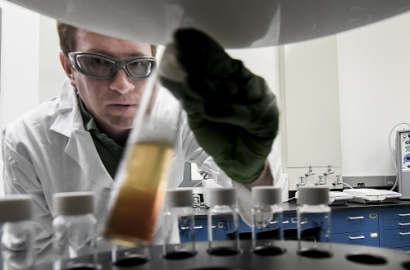
Since 2000, ExxonMobil has spent more than $9 billion to develop and deploy lower-emissions energy solutions. In May, as part of this commitment to advanced energy innovation, ExxonMobil entered into a 10-year, $100-million partnership with NREL and other DOE-funded laboratories. This partnership, the largest in NREL's history, will fund research and analysis to bring advanced energy technologies to market, focusing on emissions reduction.
Through the partnership, ExxonMobil and NREL will work on a project based on NREL's biofuels emissions work. NREL analysts will model air pollutant emissions from the entire biofuels supply chain, as well as the resulting impacts on air quality. They will also study how air quality regulations can impact the operation and sustainability of biorefineries.
“ExxonMobil came to us having recognized the years of work supported by BETO [DOE's Bioenergy Technologies Office] in developing robust understanding and analytical capability for air emissions across the biofuel supply chain, as well as our longstanding capability in developing novel biofuel conversion processes,” said NREL Senior Scientist Garvin Heath, who is principal investigator for the new project.
The project’s scope of work will include an analysis of how biorefinery designs can affect multiple environmental sustainability objectives, such as the reduction of greenhouse gas emissions in the transportation sector, the ability to permit new facilities or modifications to existing facilities to incorporate bio-based content, and the achievement of our nation’s air quality goals as stipulated by the Clean Air Act.
This project is aimed at achieving an integration of process and air quality models to analyze multiple sustainability objectives. No models currently exist to achieve this. Biofuels projects of the past have generally focused on a singular objective, but this is the first time that multiple objectives will be viewed as an integrated set for optimization.
NREL’s analysis will also help to de-risk investment in biorefineries by contributing to their effective design. All potential industrial facilities must secure permits before beginning construction and operation, and to receive these permits, biorefineries must prove that their designs will allow for compliance with federal air quality standards. Integrating the models and analysis will ensure that no matter the changes in biorefinery plant designs the state conditions, such as temperature, pressure, and mass balance are maintained. In the end, this means that a plant can function as it was designed to, and that the permitting process can be accelerated.
Heath sees blue skies—and improved air quality—on the horizon. “The collaboration is leading towards a future where novel biorefineries can more quickly and assuredly receive their necessary air permits, and the whole biofuel supply chain contributes towards achievement of our nation’s air quality goals,” he said.

